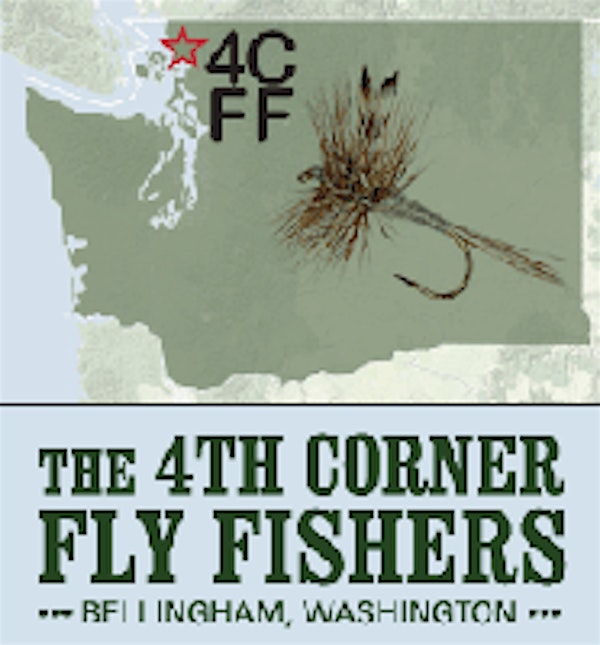
4CFF General Meeting - March 2015
Date and time
Location
Bellingham Golf and Country Club
3729 Meridian Street Bellingham, WA 98225Description
This month’s general meeting of the 4th Corner Fly Fishers will be held at the Bellingham Golf and Country Club on March 26, 2015. The Wet Fly will begin at 6pm with dinner at 6:45. The program will begin at 7:30 and will be followed by the general membership meeting.
This month we welcome two of my colleagues from Western Washington University, David Hooper (Biology) and Hart Hodges (Economics) to discuss a unique class that they have been co-teaching for the past few years: The Ecology and Economics of Salmon Recovery.
Here is how Dave and Hart describe the class:
The class is a chance for us to introduce key issues related to ecosystem services in biology and economics, using salmon restoration as the focus. We cover specific concepts from biology and economics, with a focus on salmon…while highlighting ways that the disciplines complement each other or rely on each other. Students are exposed to a basic stock-recruit growth model and they have to think about genetic diversity, what makes for good habitat, etc. while also learning about opportunity cost, the tragedy of the commons, discounting, and nonmarket valuation. We include a moderate amount of math, so students can work on using quantitative skills and connect that math with basic ecological and economic concepts. Finally, the course includes an overnight field trip to the Elwha River to look at the restoration work and natural experiments underway with the dam removal.
Here are a few of the questions we ask the students:
- If a biologist can describe pretty easily what we need to do for salmon restoration (whether improving habitat, reducing harvest, or something else), why is it such a contentious issue and/or why is it proving so difficult to fix the problem?
- What are the salmon worth?
- What role can hatcheries play, if our real focus is on protecting/enhancing wild populations?
- If it made economic sense to remove the dams on the Elwha, why aren’t we hearing about the removal of other dams?
The program will include a short description of this course and extended Q&A / panel discussion where we can all interact with Dave and Hart. You’ll be given a chance to answers some of the questions posed to the students in this course, and also an opportunity to ask your own questions of these experts on the ecology and economics surrounding salmon recovery. We promise it won’t give you too many flashbacks to your college days, but like any good university experience we hope it provides a stimulating evening of discussion (minus the fraternity parties and football games).
Here is a bit more about our guests:
Hart Hodges is an Associate Professor of Economics at Western Washington University, where he also serves as the director of the university’s Center for Economic and Business Research. In addition to his work at the university, Hart is a registered investment advisor and vice president at Waycross Investment Management Company. His academic research interests include water resource economics and policy, health economics, and local economic development. Hart volunteers his time on several boards of non-profit organizations. Hart is a past president of the Association of University Business and Economic Research and a member of the National Association of Business Economists. He is currently on the board of the Northwest Workforce Development Council, St. Paul’s Academy, and the Northwest Economic Development Council. He received his Ph.D. in economics from the University of Washington, his Masters in Environmental Management from Duke University, and his BA from Williams College.
David Hooper is a professor in the Biology Department at Western Washington University. His research specialties are in ecosystem nutrient cycling and plant community ecology, so when talking about salmon, he is the inverse of a “fish out of water”. Dave became interested in watershed ecology while serving for 9 years on the Board of Directors of the Nooksack Salmon Enhancement Association; he currently participates in the working group for the Natural Resources Marketplace. He and his students have done several projects assessing the effectiveness of riparian restoration in Whatcom County, and are currently working to test models used to predict benefits of restoration activities for ecosystem services, including water quality and salmon habitat. He has also worked in Arctic tundra and grasslands in California and Inner Mongolia. He received his BA in Chemistry from Middlebury College and his PhD in Biology from Stanford University.
Please RSVP for the membership meeting by Tuesday, March 24 (midnight deadline) by visiting http://4cff.eventbrite.com, by email at msr@deepsnow.com, or by phone at 360-319-1350. Be sure to indicate if you’ll be having dinner or just attending the meeting, and remember that a dinner reservation made is a binding commitment to pay. Also, a reminder that getting your RSVP in on time helps us provide an accurate count for the kitchen and we very much appreciate your help in placing your reservations on time.
Tight lines,
matt
Matt Roelofs
4CFF Internal VP and Program Chair